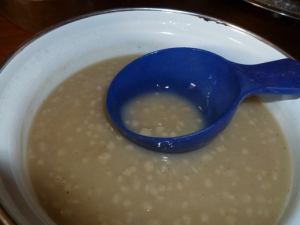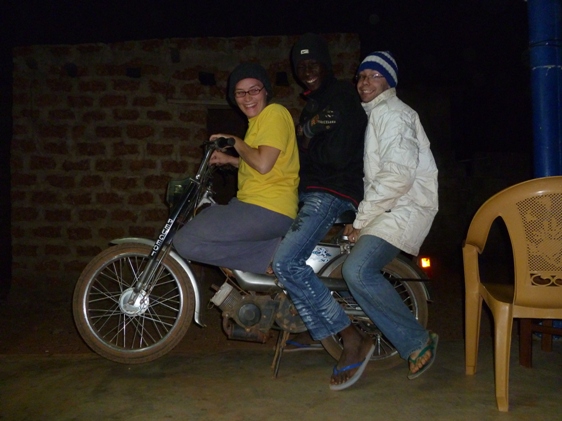Salut à tous,
L’article (anglais) d’aujourd’hui vient d’un autre défi issu de la campagne Mettez-moi-au-travail-pour-un-jour-au-Burkina). Un des quatre défis de Mark Abbott était de faire rire un enfant. Alors que je fais généralement rire les enfants régulièrement juste en étant bizarre, j’ai plutôt pensé prendre cette occasion pour vous présenter Rahim.
________________________________________________________________
Five-year old Rahim lives with his grandparents in Bobo-Dioulasso, which is my base city between the agricultural college and the university. When I first met him, Rahim was very shy with me. For the two days I was there with my coach Val (who gets along very well with him), I didn’t really talk with Rahim at all.
Making children laugh is kind of an easy job. Just being white is often funny enough for most. Walking down the street, even in a big city like Bobo, small kids will yell out Toubabou! (white person in Dioulla) with big smiles and often laughs. Rahim seemed really intimidated though.
One day, Rahim was playing with Val’s laptop adapter. He was saying “Look how hot it is, feel it!”. In a move that I was sure would amuse only myself (typical unusual, generally-considered-odd referential humour that I am in some places famous for), I said “Let me see that,” and when I grabbed it reacted as if I had just taken a burning coal, clutching it in my fist, shaking my whole body and letting out a sort of long wavering cry (for dinosaur fans, think Professor Grant in Jurassic Park 1 when he grabs the electric fence and pretends to get shocked). I thought I’d be greeted with blank stares but instead Rahim got a real kick out of it, laughing full-heartedly. I turned to Val and said “Oh! I guess I just accomplished my challenge.”
After Val left and I stayed for another night, I figured Rahim would still be just as timid. It’s funny. He did, actually, stay shy (at least a first), but when he got home from school that day, he came straight to my room, put his school bag on my bed and sat down with me. He didn’t say anything except a barely audible hello when I said hi, but he stayed there. I didn’t really know what to do or say, but I gave it a shot and figured I’d follow Val’s example by doing his homework with him. I eventually figured out that he was much more interested in tinkering with my laptop (I don’t really know what’s normal for 5-year olds and computers anymore, but he seems like a technological genius as far as I can tell) and looking at movies than doing homework (I unfortunately don’t have anything really appropriate for him, so this has been a small lesson in parenting for me: he keeps trying to watch Dexter – that would be lovable serial-killer Dexter – and telling him it’s inappropriate has clearly not been a very successful prevention strategy).
The next few days that I went back there, this became the pattern. Whenever he could, Rahim would come looking for me – usually for play, but we did a fair amount of subtraction and division as well., Lately, Rahim’s family has become my host family when I am in Bobo and we’ve done a lot more work with reading, which he has a fair amount more trouble with. I’ve gone back to some basics with him and taken out the EWB secret weapon, markers and flipcharts. These days, I spend most of my family time with Rahim, sometimes doing his homework, other times explaining to him how to play Megaman X (to Watson: at least someone thinks I’m good at it) and often just doing my own work with him next to me. It’s been a really cool part of integration that I didn’t expect, and an opportunity for personal development that I suspect has nothing to do with Burkina, but more to do with teaching or even parenting in general, anywhere in the world.
___________________________________________________________
Thanks for your challenge and continuing support, Mark.
Prenez-soin de vous!
Dana









